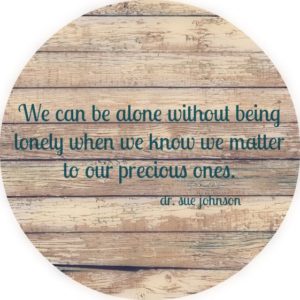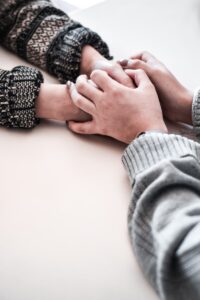“We are all so much together, but we are all dying of loneliness.” —Albert Schweitzer

In an era where so much connection is possible and the world is at our fingertips, where we have virtual reality connections via Skype or face-time or emails or tweets or texts, where all day long we hear pings and notifications and alerts that someone is ‘connecting with us’, research says that we are more lonely than ever.
Alan is a successful attorney. His work schedule and social calendars are full, yet, deep down he feels lonely and disconnected, and he feels that there is no one for him to turn to and share this deep sadness.
Rachel is a teacher, working around the clock with kids and colleagues. Yet, when she gets home in the evening she feels loneliness. Having moved for her job to a new town recently, she has been unable to form intimate connections that will take away that dreadful dark feeling. Alan and Rachel are more common then we believe. In my practice I work with adults, seniors, teens, couples, and singles. I see loneliness across the spectrum, and, I know that outside of my office, they do not talk about it.

Robert Waldinger, a Harvard psychiatrist, took over the more than 75-year-long Grant Study in 2003, becoming the fourth person to run it. He recently gave a TedTalk on it that has been viewed more than 6.5 million times since November 2015. Waldinger said in his TedTalk:
“People who are more isolated than they want to be from others find that they are less happy, their health declines earlier in midlife, their brain functioning declines sooner and they live shorter lives than people who are not lonely, good, close relationships seem to buffer us from some of the slings and arrows of getting old.”
Waldinger wants people to realize that the commercial projection of a good life – wealth, fame, career success – won’t bring them health or happiness. It’s the work they put into maintaining connections with other human beings that will.
He adds, “quality and intimacy, as well as stability and consistency also matter. Casual relationships, like the ones forged on social media won’t do; neither will contentious ones like an abusive marriage or an unreliable friend.”

“Keep in mind that to avoid loneliness, many people need both a social circle and an intimate attachment. Having just one of two may still leave you feeling lonely.” —Gretchen Rubin
In a recent article in Psychology Today, the author tries to help us understand loneliness. “What makes us happiest in life? Some people may point to fabulous fame and fortune. Yet hands down, surveys show that friends and family are the real prize. Even though our need to connect is innate, some of us always go home alone. You could have people around you throughout the day or even be in a lifelong marriage, and still experience a deep, pervasive loneliness. Unsurprisingly, isolation can have a serious detrimental effect on one’s mental and physical health.”
“I am lonely, yet not everybody will do. I don’t know why, some people fill the gaps and others emphasize my loneliness.” —Anaïs Nin

It is important to understated that loneliness is not the same as being alone. A person will always have time when they choose to be alone. Rather, loneliness is the feeling of being alone and feeling sad about it. All of us feel lonely some of the time. It is only when we seem trapped in our loneliness that it becomes a real problem.
“What should young people do with their lives today? Many things, obviously. But the most daring thing is to create stable communities in which the terrible disease of loneliness can be cured.” —Kurt Vonnegut
For many, social media has provided a pseudo escape from that feeling. At any time we can reach out to that smart phone, tablet, iPhone, in our purse or pocket, and know we can reach out… We scroll mindlessly and aimlessly, only to find out all the things that we are missing… and of course, that will increase loneliness. It seems that the ‘whole world’ is connecting and connected and having fun… ‘except for us’… It is especially serious with teens, where that pressure can add layers of loneliness that leads to depression and anxiety.

“Loneliness is never more cruel than when it is felt in close propinquity with someone who has ceased to communicate.” — Germaine Greer
As a couples and relationship psychotherapist, I so often encounter in my practice, that we can also be lonely when we are in a couple relationship. In fact as the quote above points out, it is even more poignant when I hear my clients say, “I am so lonely in this relationship.” I would say that loneliness is a silent epidemic in relationship as much as it is for individuals in our society.
As Dr. Sue Johnson points out: when we feel isolation and loneliness in our close and intimate relationships, we get scared. When we feel that primary panic and fear of the disconnect from loved ones, our primal need for secure connection becomes alarmed. We then start to act out, protest, and fight for the connection. Isolation and loneliness are danger cues for our primary survival. Our DNA is wired into that connection as a basic safety cue for survival.
At our Hold Me Tight relationship enhancement Workshop – participants will learn and experience how to:
• Affirm strengths in your relationship by developing understanding and bonding.
• Address negative cycle patterns, and learn why they show up, and how to get out of them.
• Learn how to repair and forgive injuries, and become vulnerable with each other.
• Enhance your emotional, physical, and sexual closeness and INTIMACY.
I’m delighted to be offering my next Hold Me Tight couples workshop Saturday September 17 to Sunday September 18th 2016, with Owen Marcus, MA, author, workshop facilitator, and TEDxTalk presenter on Masculine Emotional Intelligence.
Owen brings with him the width of decades of leading and facilitating men’s group all over the country, helping men access their masculine vulnerability. Owen’s presence, and his work with couples and men, will enhance this upcoming Hold Me Tight workshop, by offering his depth, support, and perspective to the couples in our workshop.
Here are the links to Owen’s work: http://owenmarcus.com and Owen’s TEDX talk: What 10,000 Years Of Progress Has Cost | TEDxSpokane

SPACE IS LIMITED. SO SIGN UP ASAP.
As I keep the groups small and intimate, if you know you want to sign up, I will encourage you to do so shortly, as they do tend to fill up.
This is a great opportunity to have a deeper and vulnerable look at your relationship, develop new skills to recognize the cycle and patterns that inflict the relationship and keep you separated and apart.
It is also a beautiful time to connect and highlight the strengths of your relationship, and build on the positives that already exist.
Please do not hesitate to Contact me with any questions or for more information. Looking forward to sharing the workshop with you and I hope you are enjoying this beautiful summer.
Warm regards,
Dalia
(530) 692 0680
dalia@daliaanderman.com
http://daliaanderman.com/workshops
RSVP on Facebook here: https://www.facebook.com/events/496868083845854/